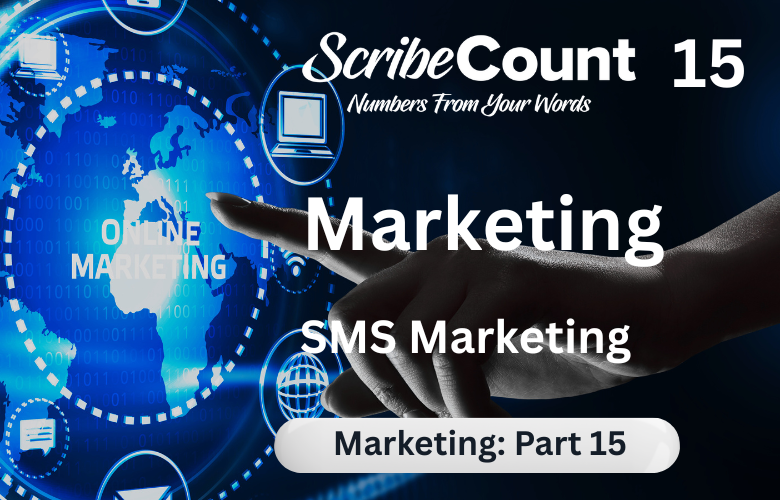SMS Marketing for Indie Authors: Real-Time Reach, Real Results
As the digital marketing landscape continues to evolve, indie authors are discovering new channels beyond traditional email and social media to connect directly with their readers. One such channel, increasingly embraced by savvy marketers, is SMS marketing. Short Message Service (SMS), or text messaging, offers indie authors a way to cut through inbox clutter and reach readers instantly with time-sensitive, high-engagement content. Used wisely, SMS can build loyalty, drive sales, and create a direct link between author and reader.
In this guide, we'll explore the fundamentals of SMS marketing for indie authors: what it is, how it works, and how to implement it ethically and effectively. We'll walk through the technical steps, provide messaging strategies, explain integrations with email and direct sales tools, and highlight ways SMS can amplify your book marketing. Done right, SMS becomes not just another tool—but a high-converting addition to your author platform.
What Is SMS Marketing and Why Does It Matter?
SMS marketing is the use of text messages to send promotional or transactional messages directly to a user's phone. Unlike email, SMS doesn’t rely on inbox filters or open rates. It boasts a 98% open rate and near-instant delivery, making it one of the most powerful communication tools available.
For indie authors, this means the ability to:
- Announce new releases and promotions in real time
- Deliver exclusive content, coupons, or bonus material
- Boost attendance for book signings or online events
- Provide delivery updates or status notifications
- Reinforce brand presence between releases
Because text messaging is intimate and immediate, it works best with a smaller, more engaged audience. That's why SMS should always be opt-in, and why it pairs beautifully with your author website, email list, and direct store. An audience that voluntarily chooses to receive SMS notifications is more likely to take action when you offer something meaningful—whether it’s a flash sale on your direct store or an invitation to a live author Q&A.
Setting Up SMS Marketing the Right Way
Before you send your first text, you need to set up the infrastructure. This begins with collecting phone numbers through proper consent, often via an opt-in form on your website. Many email services now offer SMS options as part of their marketing automation. Popular tools that support both include:
- Klaviyo
- MailerLite
- ActiveCampaign
- Omnisend
- Postscript (ecommerce-focused, ideal for Shopify users)
Once you have a platform, create a sign-up form with a clear explanation of what subscribers will receive. Offer a welcome incentive like a discount code or free short story delivered via BookFunnel. Keep your compliance in check by clearly stating that message and data rates may apply and that subscribers can opt out anytime.
Your SMS list should grow naturally from your most engaged followers. You can promote the sign-up opportunity on your website homepage, in your email footer, and during live appearances or virtual events. Many authors find success by offering exclusive behind-the-scenes content or early access to limited-edition merchandise.
What Makes a Good SMS Message for Authors?
SMS messages must be short, valuable, and respectful of your reader's time. The best messages:
- Get to the point quickly
- Include a link or call-to-action
- Use your author voice without being overly casual
- Feel exclusive and timely
Here’s a sample SMS message:
"New release alert! My latest sci-fi thriller Beyond the Silence just dropped. Get 20% off today only: https://mybookstore.com/beyond-silence"
Avoid overuse of emojis, slang, or salesy language. A good rule of thumb: if it feels like spam, it probably is. Keep things clean, warm, and personal. Messages should reinforce your brand tone, whether witty, dramatic, cozy, or mysterious.
Great SMS messages often mirror the same care you’d give your back cover blurb or newsletter subject line. You have just a few seconds to make an impression, so every word counts. Focus on creating a sense of urgency or exclusivity. Words like "today only," "early access," or "VIP reader bonus" help signal value.
Timing and Frequency: When and How Often to Send
The best time to send SMS messages is typically mid-morning to early afternoon, Tuesday through Thursday. Avoid sending early in the morning, late at night, or on weekends unless it’s a holiday promotion. Always segment your list based on timezone if possible.
Frequency depends on your content calendar, but once or twice per month is often enough for most authors. SMS works best for high-impact messages: launch day, flash sales, new audiobooks, live appearances, or bonuses. If you're doing a big book bundle or cross-author promo, a one-time message to alert readers can boost results dramatically.
Consider using SMS to drive attention to evergreen content as well. If you have a reader magnet that consistently converts well or a bundle that performs during seasonal events, occasional reminders sent via SMS can maintain visibility without oversaturating your audience.
How to Automate and Integrate SMS with Email
Use your marketing platform to create SMS flows that mirror your email flows. For example, if someone signs up for your reader magnet, they could receive:
- Welcome Email + Intro SMS
- Launch Announcement Email + Early Access SMS
- Sale Reminder Email + Limited-Time SMS Coupon
Services like Klaviyo and ActiveCampaign let you build automated sequences where SMS and email work in tandem. This integration ensures consistency in voice and timing, while providing readers with options for how they want to engage.
You can also automate SMS as part of your direct store. Use Shopify, Payhip, or WooCommerce with SMS-capable plugins like Postscript or SMSBump to send purchase confirmations, shipping updates, or abandoned cart nudges.
Think of your SMS automation as a support beam for your launch strategy. Each message should complement what you’re doing elsewhere—highlighting the sale that was announced via email, or reminding readers about the free audiobook preview shared on your blog.
Common Pitfalls: Oversending and Value Loss
Nothing burns out a reader faster than excessive or irrelevant texts. Every SMS you send should provide value—a discount, bonus, sneak peek, or insider info. Sending too many messages, especially if they lack substance, will lead to opt-outs and complaints.
Avoid messages that:
- Repeat what’s already been emailed without added context
- Come off as desperate or overly promotional
- Interrupt at inconvenient times (e.g., early morning or late night)
Always allow subscribers to opt out easily, and respect their preferences. SMS is a trust-based channel, and preserving that trust is key to long-term engagement. Consider using preference centers or text-based automation that lets users reply with "PAUSE" or "LESS" to reduce frequency without fully unsubscribing.
Who SMS Marketing Works Best For
The ideal SMS subscriber is an engaged fan who wants early access, deals, or event reminders. Genre fiction readers—especially romance, thriller, mystery, and fantasy fans—often respond well to direct communication. Readers who buy direct or attend events are also excellent candidates for SMS.
You can also segment your SMS list by genre, location, or behavior. For example, you might send one message to readers who attended your last virtual launch party and a different one to those who purchased your latest boxed set. Personalization increases relevance and response rates.
Bookstores and libraries may not be appropriate recipients of SMS messaging, as those communications are usually handled through email or sales platforms. However, SMS can be used by indie authors to alert local readers about upcoming bookstore signings or author talks, encouraging attendance and sales. Local geo-targeted campaigns can work especially well for in-person events.
Pros and Cons of SMS Marketing for Authors
SMS offers incredible immediacy and engagement, but it also comes with limitations.
Advantages include:
- High open and click-through rates
- Easy integration with ecommerce and email
- Direct reader connection
- Great for time-sensitive campaigns
- Works well for short-form offers and limited-time exclusives
Challenges include:
- Limited message length
- Privacy and compliance concerns
- Potential for subscriber fatigue
- Not ideal for long-form storytelling
- May require additional software or cost depending on volume
Like any marketing channel, the success of SMS depends on the clarity of your strategy and the value of your offer. When combined with good copywriting and a solid book funnel, SMS can lead to measurable increases in reader loyalty and revenue.
Final Thoughts: Build Connection, Not Just Campaigns
SMS marketing gives indie authors a rare opportunity: a direct, uncluttered channel into their readers’ daily lives. But this comes with great responsibility. The best use of SMS is to surprise and delight—not to sell relentlessly. When your messages are relevant, respectful, and rewarding, readers will welcome them.
Start with a clear opt-in, tie your messages to real value, and integrate SMS into your existing ecosystem. Pair it with your email flows, use it to reinforce direct sales, and let it amplify your biggest moments—like launch day, giveaways, or personal appearances.
Use SMS to create a sense of belonging among your readers. When a subscriber receives a text from their favorite author and it contains something meaningful—a character insight, a one-day-only deal, or a thank-you gift—it transforms a transactional moment into a relationship-building experience.
Used with care and creativity, SMS marketing becomes a valuable tool for growing your brand, nurturing fans, and standing out in a crowded market. Your message isn’t just a notification—it’s a reminder of why your stories matter, and why readers keep coming back for more.

